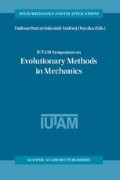Abstract
Genetic Algorithms (GAs) are recognized as an alternative class of computational model, which mimic natural evolution to solve problems in a wide domain including machine learning, music generation, genetic synthesis etc. In the present study Genetic Algorithm has been employed to obtain damage assessment of composite structural elements. It is considered that a state of damage can be modeled as reduction in stiffness. The task is to determine the magnitude and location of damage. In a composite plate that is discretized into a set of finite elements, if a jth element is damaged, the GA based technique will predict the reduction in Ex and Ey and the location j. The fact that the natural frequency decreases with decrease in stiffness is made use of in the method. The natural frequency of any two modes of the damaged plates for the assumed damage parameters is facilitated by the use of Eigen sensitivity analysis. The Eigen value sensitivities are the derivatives of the Eigen values with respect to certain design parameters. If ωiu is the natural frequency of the ith mode of the undamaged plate and ωid is that of the damaged plate, with δωi as the difference between the two, while δωk is a similar difference in the kth mode, R is defined as the ratio of the two. For a random selection of Ex,Ey and j, a ratio Ri is obtained. A proper combination of Ex,Ey and j which makes Ri−R=0 is obtained by Genetic Algorithm.
Access this chapter
Tax calculation will be finalised at checkout
Purchases are for personal use only
Preview
Unable to display preview. Download preview PDF.
References
Cawley, P. and Adams, R.D., “The location of defects in structures from measurement of natural frequencies”, J. Strain Analysis, Vol.14, No.2,1979, pp.49–57.
Goldberg, D.E., Genetic algorithms in search, optimization and machine learning, Addison-Wesley, Reading, Mass., 1989.
Holland, J., Adaptation in natural and artificial systems, Univ. Michigan Press, Ann Arbor, Michigan, 1975.
Johnson, V.T., Biologically Inspired Computational Methods(BICMs) in the structural design and damage Assessment of composites, PhD thesis, Indian Institute of Science, 1997.
Author information
Authors and Affiliations
Editor information
Editors and Affiliations
Rights and permissions
Copyright information
© 2004 Kluwer Academic Publishers
About this paper
Cite this paper
Johnson, V.T., Anantha Ramu (Late), S., Raghu Prasad, B.K. (2004). Genetic Algorithm for Damage Assessment. In: Burczyński, T., Osyczka, A. (eds) IUTAM Symposium on Evolutionary Methods in Mechanics. Solid Mechanics and Its Applications, vol 117. Springer, Dordrecht. https://doi.org/10.1007/1-4020-2267-0_13
Download citation
DOI: https://doi.org/10.1007/1-4020-2267-0_13
Publisher Name: Springer, Dordrecht
Print ISBN: 978-1-4020-2266-1
Online ISBN: 978-1-4020-2267-8
eBook Packages: Springer Book Archive

